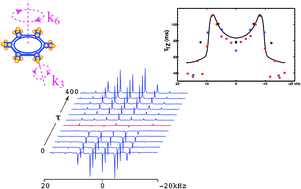The signal to noise ratio of solid state deuteron NMR line shapes can be significantly improved by recording multiple echoes, generated either by a quadrupole Carr–Purcell–Meiboom–Gill pulse train (QCPMG) or by magic angle spinning (MAS). It is shown in this article, theoretically and experimentally, that when these techniques are used to record partially relaxed spectra, the relaxation times of Zeeman order, T1Z, and quadrupole order, T1Q, measured for individual side bands in QCPMG experiments preserve relaxation time anisotropy, while rotational side bands in MAS spectra do not. The relaxation times of individual QCPMG sidebands are not identical to those measured at the same frequencies on partially relaxed quadrupole echo powder patterns, and must be computed by explicit simulation.
You have access to this article
 Please wait while we load your content...
Something went wrong. Try again?
Please wait while we load your content...
Something went wrong. Try again?


 Please wait while we load your content...
Please wait while we load your content...